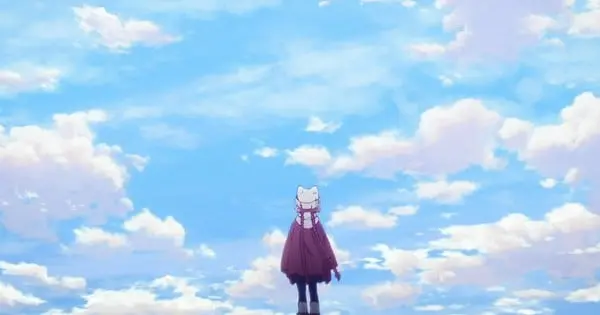“Apocalypse Hotel,” an original Japanese anime television series produced by CyberAgent and animated by CygamesPictures, has captivated audiences with its unique blend of post-apocalyptic themes, slice-of-life moments, and surreal comedy. Set in the year 2057, the series depicts a world where an unknown aerial contagion has forced humanity to flee Earth, leaving behind a solitary hotel in Tokyo’s Ginza district. This hotel, the Gingarou, is maintained by a team of autonomous robots led by the gynoid concierge, Yachiyo. Episode 11 takes a departure from the usual narrative, offering a poignant and visually stunning exploration of Yachiyo’s character and the remnants of human civilization.
A Day Unlike Any Other
Episode 11, titled “Wag Your Tail, but Never Wag a Shift!” marks a significant turning point for Yachiyo. After Ponko studies Japanese labor laws, Yachiyo is mandated to take two days off from work. Initially unsure of what to do with her newfound freedom, Yachiyo checks into the hotel as a guest. During a routine system check, she discovers that one of her parts is beginning to fail. This realization prompts her to embark on a journey through the ruins of Ginza in search of a replacement part.
A Dialogue-Free Odyssey
One of the most striking aspects of Episode 11 is its minimal dialogue. For a significant portion of the episode, Yachiyo’s exploration of Ginza unfolds without any spoken words. This creative choice allows the visuals and the musical score to take center stage, creating a deeply immersive and emotional experience for the viewer. The absence of dialogue emphasizes the desolation of the post-apocalyptic world and Yachiyo’s isolation as she navigates the remnants of human society.
The Haunting Beauty of Decay
As Yachiyo wanders through Ginza, the episode presents a series of hauntingly beautiful visuals. Nature has begun to reclaim the urban landscape, with plants and vegetationOvergrowing buildings and streets. The crumbling infrastructure serves as a stark reminder of humanity’s absence, while also highlighting the resilience of nature. The artistry of the backgrounds evokes a sense of longing and emptiness, reminiscent of seminal works in the post-apocalyptic genre, such as “Yokohama Shopping Log.”
A Search for Self
Yachiyo’s quest for a replacement part becomes a metaphor for her search for self. As she explores the ruins of Ginza, she encounters various landmarks and tourist destinations, each serving as a window into the past. She tries on different casual outfits, eats street food, and visits a pachinko parlor, experiences that allows her to connect with the human world she is programmed to serve. It’s the first time we’ve seen her do things because she wants to without any obligation to anyone else.
Echoes of Humanity
Despite the absence of humans, their legacy is palpable throughout the episode. Crumbling buildings, cracked consumer goods, and even a gaudy pachinko parlor serve as reminders of human existence. These ruins provide the scaffolding on which nature continues to thrive, suggesting that even in decay, there is a sense of continuity and resilience.
Artistic Brilliance
Critics have lauded Episode 11 for its artistic ambition and execution. The episode eschews traditional narrative structures in favor of a more primordial means of communication, appealing to the viewer’s emotions through visuals and music.
Musicality
The musical score of Episode 11 is particularly noteworthy. A quiet and curious piano narrates Yachiyo’s trip down memory lane, while Brian Eno-esque soundscapes accompany her journey further into the city. The episode culminates in a flight back to the Gingarou, suffused with Disney musical schmaltz, showcasing the variety of styles that composer Yoshiaki Fujisawa masterfully blends.
Animation and Visuals
The animation quality in Episode 11 is exceptionally high. The staff crafts an animated tone poem that is both visually stunning and emotionally resonant. The character designs are deceptively simple, yet they manage to convey a wide range of emotions, particularly through Yachiyo’s expressive face. The backgrounds are lush and detailed, creating a sense of immersion in the post-apocalyptic world.
Themes and Interpretations
Episode 11 of “Apocalypse Hotel” delves into several complex themes, inviting viewers to contemplate the nature of life, death, and legacy.
The Meaning of Life
One of the central themes of the episode is the meaning of life. Yachiyo, despite being a robot, grapples with questions of purpose and existence. Her inability to turn off her “manager mode” even on her day off suggests that her identity is deeply intertwined with her role at the hotel. However, her exploration of Ginza allows her to experience new things and connect with the human world in a way that transcends her programming.
Mortality and Legacy
The episode also touches on the themes of mortality and legacy. Yachiyo’s realization that one of her parts is failing serves as a reminder that her time on Earth is not infinite. The autumn landscape, littered with fallen leaves, further reinforces the idea of transience. However, the episode suggests that death is what gives life meaning and that even in decay, there is a legacy to be found.
Nature vs. Technology
“Apocalypse Hotel” explores the relationship between nature and technology. In Episode 11, nature reclaims the urban landscape, Overgrowing buildings and streets. Yachiyo, as a robot, represents technology, yet she is not in conflict with nature. Instead, she finds a way to coexist with it, appreciating its beauty and resilience. This suggests that nature and technology are not mutually exclusive but can exist in harmony.
Fan Theories and Discussions
Episode 11 has sparked numerous discussions and fan theories among viewers. Some have interpreted Yachiyo’s journey as a metaphor for the human experience, while others have focused on the episode’s environmental themes.
A Deeper Dive Into the Series
Some fans have pointed out that the episode’s title, “Wag Your Tail, but Never Wag a Shift!” is a clever play on words, suggesting that even on her day off, Yachiyo cannot fully escape her work. Others have noted the episode’s subtle references to previous episodes, such as Yachiyo’s encounter with a creepy unicorn, a nod to the series’ surreal and comedic elements.
A Penultimate Masterpiece
As “Apocalypse Hotel” approaches its finale, Episode 11 stands out as a masterpiece of visual storytelling and thematic exploration. The episode’s minimal dialogue, stunning animation, and haunting musical score create a deeply immersive and emotional experience for the viewer. By delving into Yachiyo’s character and the remnants of human civilization, Episode 11 offers a poignant reflection on the meaning of life, death, and legacy.
Setting the Stage for the Finale
With the finale on the horizon, Episode 11 leaves viewers eagerly anticipating the conclusion of Yachiyo’s journey. What will become of the Gingarou Hotel? Will humanity ever return? These questions remain unanswered, but one thing is certain: “Apocalypse Hotel” has established itself as a unique and unforgettable anime series.
“Apocalypse Hotel” is currently streaming on Crunchyroll.









